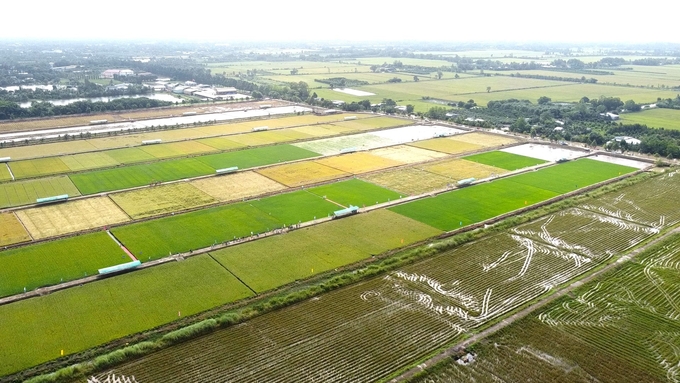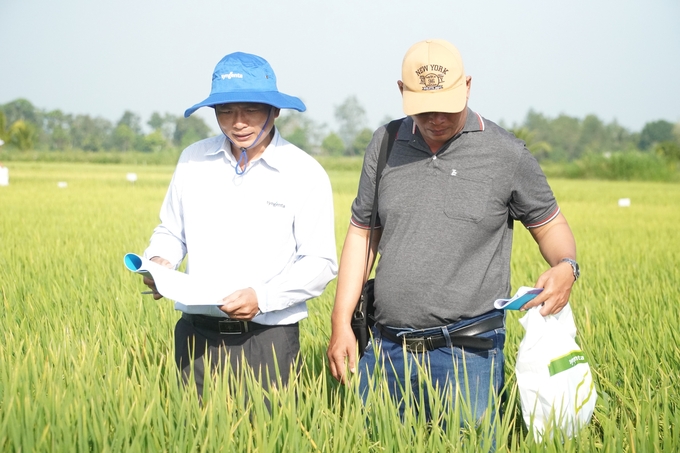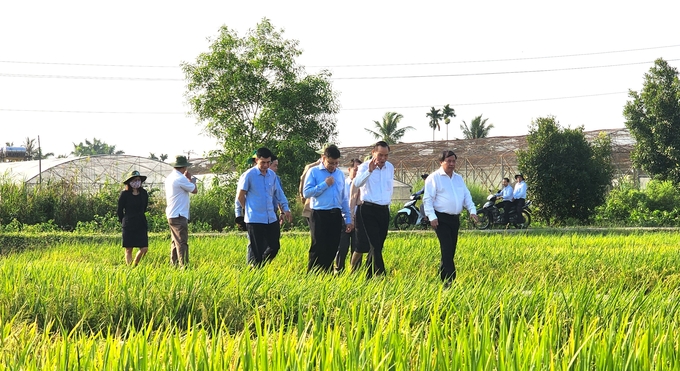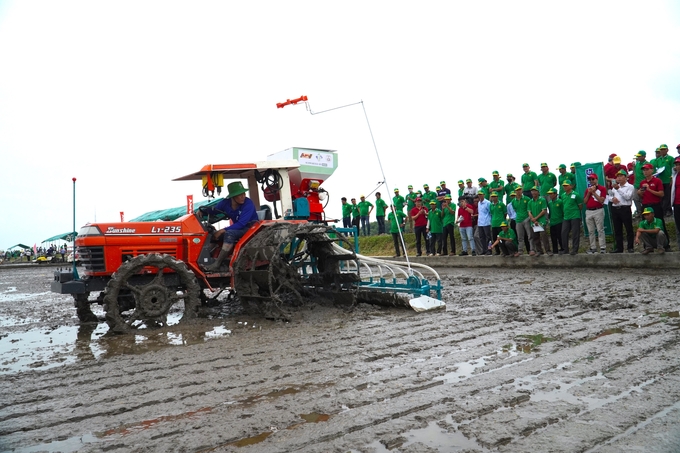May 30, 2025 | 05:19 GMT +7
May 30, 2025 | 05:19 GMT +7
Hotline: 0913.378.918
May 30, 2025 | 05:19 GMT +7
Hotline: 0913.378.918

Experimental field and large-scale production field at the Cuu Long Delta Rice Research Institute in O Mon district, Can Tho city. Photo: Kim Anh.
Over its 46 years of establishment and development, the Cuu Long Delta Rice Research Institute (CLRRI) has constantly upgraded, renewed, and modernized its infrastructure and equipment to better meet the requirements of scientific research and technology transfer in rice breeding according to the current market mechanism.
Director Ph.D. Tran Ngoc Thach expressed his pride that, at present, CLRRI has two facilities, including a working house, a net house, a cadre (official housing area), an experimental field, and a production field with a scale of over 360ha. In the period 2018–2022, CLRRI has selected, created, and transferred into production about 44 rice varieties. In addition to the 16 rice varieties officially recognized or recognized for circulation, 28 rice varieties are protected.
In particular, the OM rice varieties bred by CLRRI are widely grown in the region and account for a large proportion of the structure of exported rice. Of which many rice varieties have become the main force in production in the Mekong Delta, such as OM5451 and OM18, with an annual planting area of 750,000 to 850,000 ha for each variety. These two rice varieties today contribute about 70% of Vietnam’s exported rice, laying the foundation for the development of a high-quality rice variety group widely planted throughout the Mekong Delta.
Ph.D. Tran Ngoc Thach also emphasized that the Institue’s rice breeding work is being adjusted towards diversity in rice quality, high productivity and quality, economic value, and adaptation to climate change.

Every year, CLRRI conducts trials and demonstrations of new rice varieties to select ones with outstanding characteristics to supplement the region’s rice production structure. Photo: Kim Anh.
In parallel with the process of research, selection, creation, and transfer of rice varieties into production, CLRRI also focuses on synchronously developing technical advances in rice cultivation, such as rice cultivation processes for four ecological sub-regions in the Mekong Delta, organic rice farming processes in the rice-shrimp farming system on the West Coast, and application models of integrated transplanters with fertilizer on a scale of 10 ha/province in Soc Trang, Hau Giang, and Can Tho cities. CLRRI is also testing biological control measures, Ometar/Biovip biological pesticides, and 3M products on a large scale over different seasons in Soc Trang, Bac Lieu, etc.
Every year, CLRRI organizes on-site production on 220ha and co-produces over 500ha. At the same time, coordinate with units in the Mekong Delta to supply 50–60 tons of super-thoroughbred seed, 800-900 tons of thoroughbred seed, and 3,500–4,000 tons of certified rice seed to localities. Thereby contributing to bringing the total rice production area in the Mekong Delta with using seeds meeting standards at all levels from less than 10% in 1999 to now increasing from 50 to 60%.

Deputy Minister of Agriculture and Rural Development Phung Duc Tien visited and worked at the Cuu Long Delta Rice Research Institute. Photo: Kim Anh.
The Institute has actively expanded the signing of cooperation agreements with many organizations and individuals in the research, testing, and completion of products such as fertilizers and pesticides, with a budget of VND 3–4 billion/year. At the same time, the Institute has signed many memoranda of understanding with businesses and units in the breeding and development of good-quality rice varieties for localities.
Besides, the Institute also signed agreements with many partners, who are enterprises, cooperatives, and seed centers in the provinces in the region, to exploit the right to use OM rice varieties in production and business in the Mekong Delta. Up until now, the CLRRI has signed a contract to transfer the common use rights of OM rice varieties to 51 units, transfer ownership of eight rice varieties, and authorize 10 units to develop and exploit the use rights for 25 rice varieties.
Every year, the Cuu Long Delta Rice Research Institute also conducts testing of new rice varieties in localities with the aim of selecting new varieties with outstanding characteristics to supplement the rice production structure. In the context of the market economy and the general difficulties of the economy, especially scientific research activities facing the requirement of autonomy, CLRRI is required to constantly improve the quality of scientific research through creative innovation. Especially, there must be good mechanisms and policies to "retain" scientists.
CLRRI determined that research and breeding of rice in the direction of improving rice quality (rice quality, milling quality, nutritional value, and use) are the focus. In which the focus is on breeding rice varieties that are resistant to pests and adverse weather conditions and suitable for the current climate change context in the Mekong Delta. Moreover, the Rice Institute also "hits" the trend and demand of the domestic and export markets for fragrant, high-quality rice that can be processed. On the basis of assessing the nutritional potential of rice varieties and developing high-value products from rice and rice by-products in rice production and processing.

The Cuu Long Delta Rice Research Institute regularly strengthens cooperation with international businesses and organizations to conduct research and transfer technical advances into production for farmers. Photo: Kim Anh.
It is also necessary to promote scientific research in the direction of applying advanced and high-tech materials and microbial and organic products to save input materials. Research and develop models of rice production in rotation with crops and fisheries, adapting to climate change, especially in flooded, drought, and saline conditions in hard and saline areas in the system of fish and shrimp farming along the coast. This model aims to better meet the production needs of farmers in the Mekong Delta today.
Currently, CLRRI is conducting research, evaluation, and exploitation of genetic resources of indigenous plants, such as local seasonal rice, to restore special-season rice varieties to serve domestic consumption needs. At the same time, develop rice varieties that are better able to adapt to climate change, use fertilizers efficiently, suitable for mechanization, increase rice quality and nutrition, resistant to pests and diseases, and have high economic value. Toward the construction of specialized rice production areas with high commodity value, associated with the building of certification marks for rice products.
Ph.D. Tran Ngoc Thach also wishes to develop a long-term research strategy on rice plants and rice-based farming systems in the Mekong Delta and enhance equipment, especially high-tech application equipment serving research and selection of new rice varieties and scientific and technological services. At the same time, he wishes the Ministry of Agriculture and Rural Development to consider investing in a modern, closed seed processing line with an industrial scale as a model for rice seed processing technology in the region.
Recently, during a visit and working session with CLRRI, Deputy Minister of Agriculture and Rural Development Phung Duc Tien assessed that, currently, with 134 intensively trained staff, CLRRI has met the requirements for scientific research, kept pace with the market, and associated with businesses to research and breed high-quality, high-yielding rice varieties to serve the needs of developing the rice industry.
In the current trend of economic autonomy, the Deputy Minister hopes that the Mekong Delta Rice Institute will quickly access the market, strengthen communication, and coordinate with industry associations and the Departments of Agriculture and Rural Development of provinces and cities in the Mekong Delta region to replicate the results of scientific research.
Translated by Huyen Vu Thu
/2025/05/25/4127-3-073637_820.jpg)
(VAN) Thanks to the promotion from an FAO-implemented project, vegetable production in greenhouses in Moc Chau has seen strong development, from 1.5 hectares in 2021 to nearly 50 hectares in 2024.

(VAN) FAO has recently supported USD 140,000 to implement the project 'Risk mitigation human-animal interface risks through disease control initiatives in pig farming.'

(VAN) The People's Committee of Tra Vinh province has approved an adjustment to the investment policy for the Green Hydrogen Plant project, increasing its area to approximately 52.76 hectares.
![Reducing emissions from rice fields: [2] Farmers’ commitment to the soil](https://t.ex-cdn.com/nongnghiepmoitruong.vn/608w/files/news/2025/05/05/dsc08881jpg-nongnghiep-140632.jpg)
(VAN) Clean rice cultivation model in Thuong Tan commune, Bac Tan Uyen district, is assisting local residents in achieving sustainable agriculture by substantially reducing costs, increasing productivity, and protecting the environment.

(VAN) At the conference to disseminate Resolution No. 68, AgriS introduced its digital agricultural ecosystem and reaffirmed its commitment to accompanying the Government in promoting private sector development and sustainable agriculture.

(VAN) 'Blue Ocean - Blue Foods' initiative is designed to restore marine ecosystems and establish sustainable livelihoods for local communities by cultivating a minimum of 1,000 hectares of cottonii seaweed in the first three years.
/2025/05/21/4642-3-112707_603.jpg)
(VAN) The V-SCOPE project has made direct contributions to three out of six pillars of the Comprehensive Strategic Partnership between Vietnam and Australia.